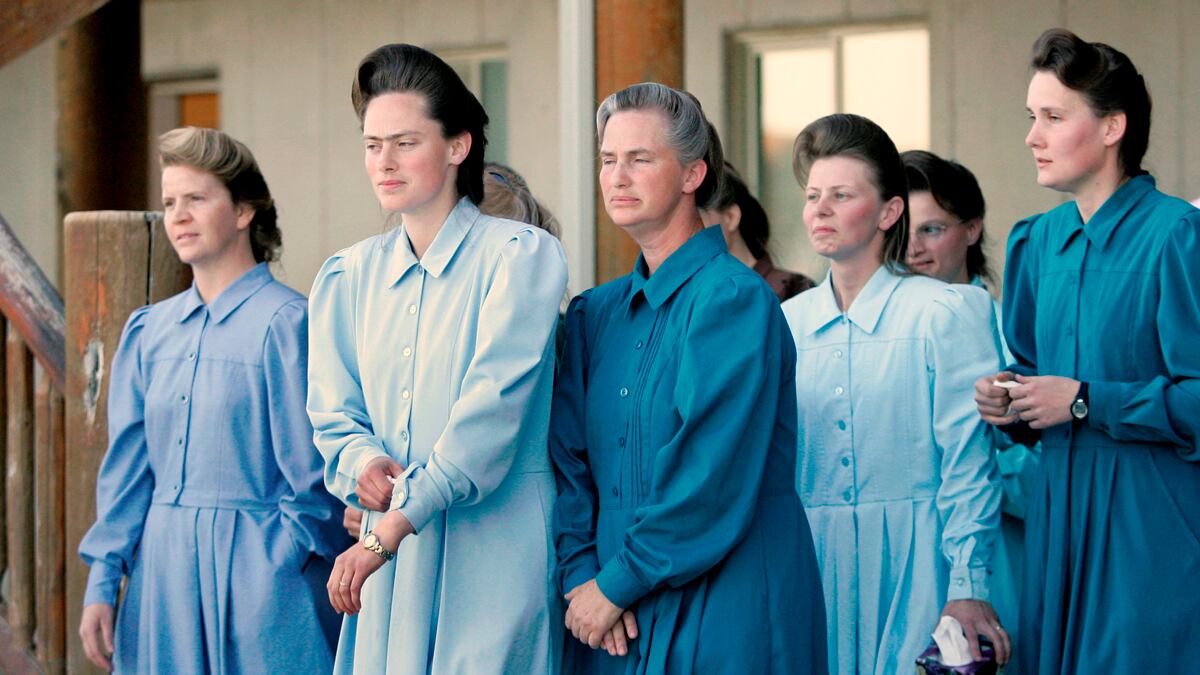We all remember the image of hundreds of Mormon mothers, clad in pastel prairie dresses, trooping in and out of Texas courthouses, trying for three months to reclaim their children. It was the spring of 2008, and it would become the largest custody battle in U.S. history.
We may have forgotten, however, that it was Rick Perry who was behind the raid that put these women there in the first place—a massive seizure of the Warren Jeffs-led fundamentalist Yearning for Zion Ranch, led by the state’s Child Protective Services, that put 468 children in protective custody (though 29 of them would turn out to be over 18). Prompted by a call to a domestic-abuse hotline, it was the first drone-protected raid on domestic soil, complete with SWAT teams and an armored personnel carrier standing by, according to the Texas Monthly.
Perry said the raid was a mission to safeguard children against sexual abuse. (Editor's Note: The polygamous Yearning for Zion Ranch is not part of the Church of Jesus Christ of Latter-Day Saints, the faith to which Mitt Romney belongs. The YZR is commonly referred to in news accounts as a splinter group of Mormons.) But a Texas appeals court, affirmed by the state’s supreme court, ruled the raid illegal, finding that CPS had “abused its discretion.” “I am substantially less interested in these fine legal lines,” Perry said at the time.
In the weeks following, Perry was asked if he believed the illegal raid should result in firings or disciplinary actions at CPS. Perry insisted that the agency had “acted in the best interests of these children,” and though CPS workers threatened mothers with arrest for waving at their own family members—and were described in reports filed by observers from a local mental-health program as “bent on humiliating” these families—Perry said he was “very proud” of the agency, which he argued had handled a “complex situation both professionally and compassionately.”
In fact, CPS had declared everyone at the compound “essentially one household”—a rationale the agency used to remove all the children, but a legal standard the courts found contrary to law and fact. The agency went so far as to seize infants without any evidence that they were in danger. Its Perry-appointed commissioner told a Texas Senate committee that half the girls between 14 and 17 were pregnant or already had children, a falsehood that was quickly rebutted. The domestic-abuse hotline call that sparked the raid turned out to be a hoax.

But in the end, it was the indiscriminate, sweeping nature of the seizure and foster-care placements that prompted both a swing in the media coverage against CPS and the court-ordered return.
“There were no grounds to take all of those children,” says Susan Hays, a private, court-appointed ad litem attorney who represented some of the kids. Although she says the governor’s office had to be directly implicated—“because the National Guard helped with the raid and only the governor can authorize that,” she says—when the case blew up, “no one would admit to making the call.”
When the children were returned to their families after three months, CPS was supposed to launch a new and more careful form of supervision, with all of the compound’s children now subject to individual investigation and possible remediation. Charles Childress, who ran a clinical children’s rights program at the University of Texas law school and is a well-known advocate in the state, was brought in to oversee the handling of the individual cases. He pressed for adoption as a remedy in the most egregious cases of abuse and wanted to take some of the cases to trial. But CPS chose not take action in 300 of the cases, deciding, instead, to do nothing.
Childress went to meet with higher-ups in the governor and attorney general’s offices to press for trials in cases he thought were winnable. But instead, “They’d ask, ‘Well, can you guarantee us it will win?’” Childress told Texas Monthly in 2009. He told the governor’s staff he could never guarantee a win in a jury trial. “Going up to the governor, none of them had any idea what was going on,” he said then. “They had no clue.” Reached by The Daily Beast this week, Childress continued to express the frustration he felt in 2008 with the Perry administration. “I can’t tell you one way or the other what Perry’s attitude towards Mormons is,” he says, attributing Perry’s reluctance to act on behalf of these children to the fact that Perry “hates to be identified with big government.” (Though Perry apparently didn’t mind throwing the full weight of the government behind the raid and months-long separation of families.)
Three months after he was brought on, Childress quit in disgust. His immediate successor, Jeff Schmidt, filed an administrative complaint when he was taken off the cases, contending that CPS was “in possession of evidence that supports aggravating circumstances,” but still refused “to allow for termination of parental rights.” Even as Texas prosecutors began to bring criminal sexual abuse and bigamy cases against a dozen of the Yearning for Zion men, including its leader, Jeffs, CPS was walking away from cases, Schmidt said. “Children’s lives and welfare are at stake,” he wrote, “and it appears all the department is willing to do is deny any wrongdoing.”
CPS confirmed months after Childress and Schmidt’s late 2008 departures that their recommendations were “not supported” by other agency personnel and that it had every right to remove attorneys it disagreed with, noting in a San Angelo Standard Times story that only six children were, in the end, taken into state custody. “The thing I’m angriest about,” Susan Hays said then, “is you spend $12 million plus, traumatize hundreds of kids, then drop the real cases? They ran it like a political campaign. How deep in hell do you burn for that?”
Another ad litem attorney, Natalie Malonis, who represented an underage bride of Zeffs, tells The Daily Beast: “At a certain point, it seemed like there was a directive from above to walk away from the cases. And it was irrespective of the circumstances of the children who might have needed some help. The cases were just dropped.” It did appear as well, says Malonis, that CPS was “actively getting rid of” its own attorneys who “wanted to continue the cases” in favor of replacements “who were willing to drop them.” “I think that the state of Texas failed some of those kids,” Malonis says. “I think they were not true to their mission as it was stated.”
Instead, state officials were focused on prosecution, and half the leaders were convicted, one getting 75 years in jail. “My guess is they didn’t want CPS cases to distract from criminal investigations,” Hays tells The Daily Beast. “But guess what, how are you protecting children when you do that? You don’t, you sacrifice them.”
* * *
It’s against the backdrop of the “CPS fiasco,” as the Texas Tribune called the handling of the Yearning for Zion children, that the current Perry Mormon controversy is unfolding. If there’s anything this history establishes, it’s that Perry policymakers were indifferent to the needs of the Mormon children, oscillating from one extreme to the other, overreaching and then, just months later, utterly withdrawing, more responsive to public opinion than the public interest.
Slick Haley Barbour went on ABC on Sunday and offered the Perry version of how Romney’s religion wound up center stage at the Values Voter Summit this week. “Rick Perry didn’t say anything,” explained the Mississippi governor, who’s become a Perry surrogate without formally endorsing him. “Somebody who introduced Rick Perry at an event later said something. It’s not like the man even said it in the introduction when you might have expected Governor Perry to say, you know, I wouldn’t say that or I didn’t think that.” Then, to reinforce the original message of Robert Jeffress, the pastor who introduced and endorsed Perry, Barbour added that “the fact that Rick Perry is a conservative Christian helps him with a lot of people in the South” and elsewhere.
In fact, Jeffress did make his point in the introduction, distinguishing between Romney, whom he called a “good moral man,” and Perry, whom Jeffress explicitly contrasted as “a born-again follower of the Lord Jesus Christ.” When Jeffress appeared on Chris Matthews’s Hardball on Monday night, he reiterated that he’d consciously offered that comparison in his introduction, which Perry said he’d hit out of the park. Jeffress did elaborate, invoking the “cult” language, in a post-introduction interview with radio host Bryan Fischer, the spokesman for the American Family Association, the very organization that paid for Perry’s $1.5 million prayer rally in August and one of the groups sponsoring the values summit.
Perry allies Fischer and Jeffress were already well known for their views on Romney and Mormonism before the summit appearance, and the result of Jeffress’s selection to introduce Perry was as predictable as the Texas sun. The pastor said the same thing when Romney last ran, in 2008, and that October, long after Romney was out of the race, he debated the Mormon issue at a Religious Newswriters Association luncheon in Dallas. His opponent was Jay Sekulow, the chief counsel at Pat Robertson’s American Center for Law & Justice, and the event was put together by Mark DeMoss, whose PR firm specializes in representing Christian organizations. DeMoss and Sekulow are now advisers to the Romney campaign, and Sekulow introduced Romney at the Values Summit.
Jeffress argued at the 2008 debate that electing a Mormon could have “eternal consequences” for America, separating the nation from God. He built his speech around a possible head-to-head race in 2012 between Romney and a Christian governor of Texas, who he said might be Kay Bailey Hutchison, the U.S. senator who lost to Perry in the 2010 Republican primary. Hutchison, he said, “sometimes worships in our church.”
Family Research Council head Tony Perkins, the former Louisiana legislator who orchestrated the values summit, told Politico that he suggested Jeffress to the Perry campaign and Perry “checked off” on Jeffress doing the introduction. Perkins endorsed Perry in October for reelection, saying his leadership “has formed a model for the rest of the nation to emulate.” As recently as Sept. 27, Perkins was openly critical of Romney, accusing him of “not speaking as strongly to the social issues as he did four years ago” and ruminating about whether Romney’s commitment on these issues was “genuine and solid.” The intertwining of Perkins, Jeffress, Fischer, and Perry suggests that the focus on Mormonism was hardly a coincidence.
Indeed, The Response, Perry’s August prayer rally that Perkins co-chaired, pivoted around a faith statement of seven beliefs that led with the declaration that “the Bible” is the “inspired, only infallible, authoritative Word of God,” which turns the Book of Mormon into nothing more than a Broadway show. The Response featured speakers who urge the burning of the Book of Mormon, and no one, at least by any press accounts, who expressed belief in it. That would suggest Rick Perry doesn’t believe Mitt Romney is a Christian either.
Research assistance was provided by Emily Atkin, Matthew DeLuca, Kelly Knaub, Fausto Giovanny Pinto, and Andy Ross.






